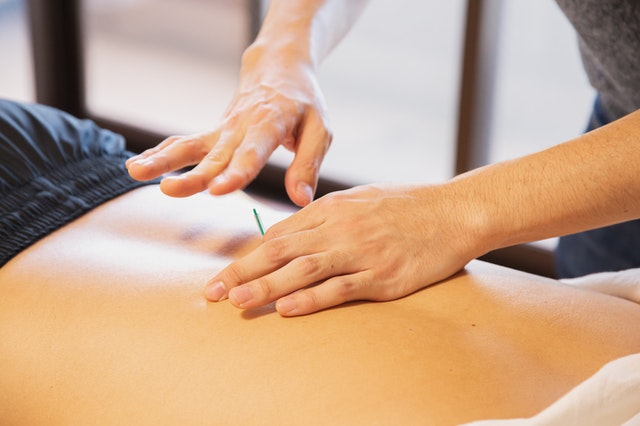What is Dry Needling?
Dry needling is the insertion of a needle into a trigger point or joint in order to increase blood flow, release tight tissue, and reset the nervous system in order to accelerate healing. Dry needling is the only modality that allows a physical therapist to directly target the muscle or pathological tissue. Patients often describe the feeling as a slight ache or a warm sensation when targeting unhealthy tissue. It usually only requires a few sessions depending on the level of injury/ damage and or length of time the tissue has been not functioning at a normal level.
Dry needling is different than acupuncture because needle placement is based on symptoms and position of pathological tissue versus in acupuncture the placement of the needle depends on opening up energy flow/ balancing meridians.
4 Benefits of Dry Needling:
- Fast Pain Relief- Your pain improves as the trigger point relaxes and blood flow improves. Better circulation means that painful, acidic wastes get carried away while your muscles receive the oxygen and nutrients they need to heal. Many patients experience an immediate reduction in local and widespread pain after one dry needling session. Others may need several sessions to achieve optimum pain relief. Your treatment plan depends on the severity and number of trigger points.
- Helps Restore Range Of Motion- If you have multiple trigger points, you may experience severely limited mobility. And when you’re not active, your muscles weaken and lose mass. A Physical Therapist will often times combine dry needling with a physical therapy program to rebuild your strength and fully restore your range of motion. Physical therapy also retrains your muscles, and this helps to prevent future trigger points.
- Aids In Speeding Up The Healing Process- Whether you suffered an injury or had surgery, moving your body is the best way to promote healing and speed up your recovery. Physical therapy is the primary treatment during the recovery process. However, adding dry needling to physical therapy can help accelerate this process.
- Helps Ease Chronic Pain- Dry needling goes a long way toward easing two chronic pain conditions, myofascial pain syndrome and fibromyalgia.
Myofascial pain syndrome occurs when trigger points develop in the fascia, a sheet of connective tissue that surrounds and supports all your muscles, nerves, blood vessels, and organs. Dry needling and physical therapy are among the best treatments for this chronic pain condition.
Fibromyalgia causes widespread pain and tenderness in your muscles. The pain affects the way you move, which in turn leads to trigger points. Patients who have fibromyalgia and get dry needling often experience significant improvement in their overall pain.
Dr. Amy Flaherty, PT, DPT, MDN, GTS is here to help you with all of your dry needling and physical therapy needs!



















